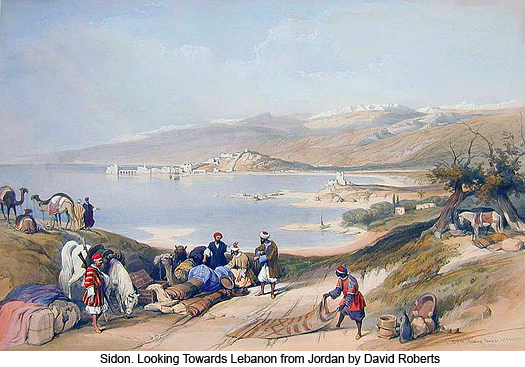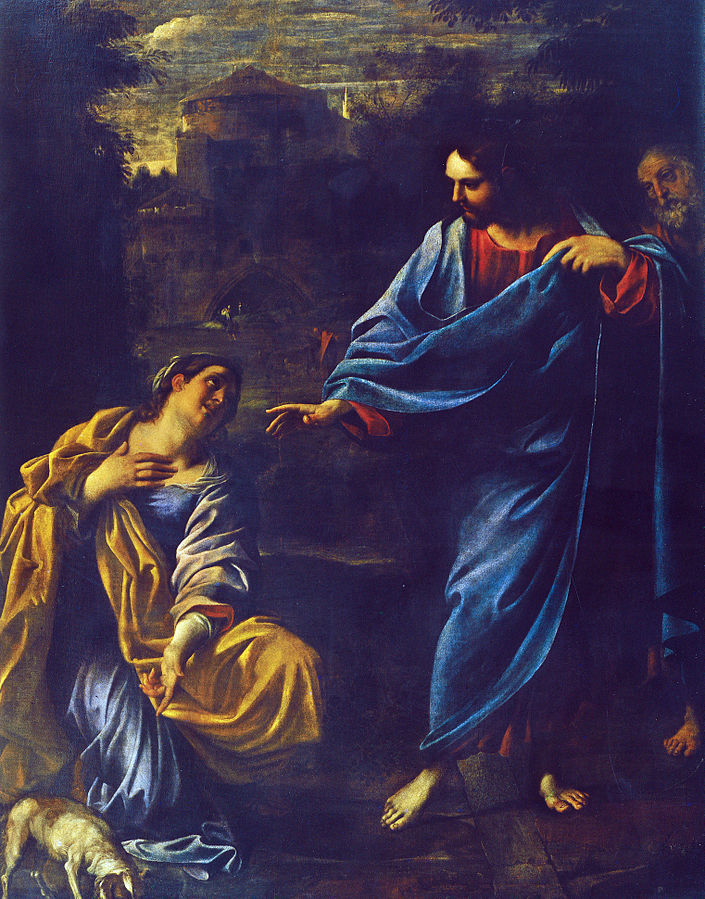Franciscan Friar Fr. Paul Gallagher reflects on the Gospel text for the Twentieth Sunday of Ordinary Time. Have you ever been the object of discrimination? Did that affect your self-understanding or your relationship with God?
The content is edited by Franciscan Sister of Christian Charity Sister Anne Marie Lom and Joe Thiel. The excerpts from the Sunday readings are prepared by Joe Thiel. To read or download the complete pdf with excerpts for your prayer, please click here Franciscan Gospel Reflection August 20 2023. Excerpts are from the Lectionary for Mass for Use in the Dioceses of the United States of America, second typical edition © 2001, 1998, 1997, 1986, 1970 Confraternity of Christian Doctrine, Inc., Washington, DC. Used with permission. All rights reserved. No portion of this text may be reproduced by any means without permission in writing from the copyright owner. Photos: David Roberts (1796 – 1864), Public domain, via Wikimedia Commons; Annibale Carracci, Public domain, via Wikimedia Commons.
Matthew 15:21-28
Then Jesus went from that place and withdrew to the region of Tyre and Sidon. And behold, a Canaanite woman of that district came and called out, “Have pity on me, Lord, Son of David! My daughter is tormented by a demon.” But he did not say a word in answer to her. His disciples came and asked him, “Send her away, for she keeps calling out after us.” He said in reply, “I was sent only to the lost sheep of the house of Israel.” But the woman came and did him homage, saying, “Lord, help me.” He said in reply, “It is not right to take the food of the children and throw it to the dogs.” She said, “Please, Lord, for even the dogs eat the scraps that fall from the table of their masters.” Then Jesus said to her in reply, “O woman, great is your faith! Let it be done for you as you wish.” And her daughter was healed from that hour.
Background:
Last’s week’s Gospel ended with the disciples giving Jesus homage. They had witnessed Jesus walking on water, rescuing Peter from the raging sea, and calming the chaos of the winds. As Matthew continues his Gospel, he states that when their boat landed at Gennesaret, the people recognized Jesus and they brought the sick for him to cure. The Pharisees and scribes from Jerusalem questioned Jesus as to why his disciples did not respect the tradition of washing before meals. Jesus responded by questioning their breaking of the commands of God by excusing someone from the obligation to care for a parent if they would declare that the money was instead dedicated to God. Jesus quotes the great prophet Isaiah to support his case. Then Jesus publicly humiliates them by turning his attention to the crowd that had gathered and offering them an instruction about what it is that really defiles a person. His instruction is only one verse, “It is not what enters one’s mouth that defiles that person; but what comes out of the mouth is what defiles one.” (Matthew 18:11) The disciples approach Jesus to make him aware that he has offended the Pharisees and scribes. Jesus disregards their concerns and continues calling them blind guides, and he goes on to explain his teaching on what it is that really defiles a person.
It is with that instruction on what truly defiles a person that Matthew begins his account of Jesus’ entrance to the pagan territory of Tyre and Sidon, where he encounters the Canaanite woman that is the focus of the Gospel text this week.
The first verse of the Gospel indicates that Jesus entered the pagan territory of Tyre and Sidon without any indication that he was compelled to do so. His actions are a contradiction of his own instruction to the disciples when he sent them on their mission to the lost sheep of Israel. “Do not go into pagan territory or enter a Samaritan town.” (Matthew 10:5b) The understanding of the day looked upon the border between Jewish and Gentile territory as being set by God, to separate God’s holy land, from the pagan territory. The woman that Jesus encounters is described as a Canaanite. This description was rarely used. It recalls the tribes that were occupying the land before the Jews gained control. The Canaanites were one of the primary enemies of the Israelites. Besides being a pagan and one of the most hated enemies of God’s people, she was also an unescorted woman in a strictly gender-divided society. These factors make Jesus’ contact with her a threat to his honor.
Jesus breaks with what was traditionally understood as sacred norms of behavior, enters the pagan lands, and encounters this mother whose daughter is possessed by a demon. She calls him “Son of David,” and asks that Jesus have pity and mercy on her. The request for mercy is a request to honor a debt that is owed. By calling Jesus “Son of David,” she is placing him in the line of King David and asking him to act according to David’s reputation of being a compassionate ruler. Even when she is ignored and insulted, she continues to treat Jesus with respect and honor. Jesus is touched in a way that leads him to both cure the daughter and remark about the faith of the woman. There is no indication in the text that Jesus had deliberately gone to the region with the intention of extending the blessings of God’s healing to a non-Jew. The opening part of the dialogue seems to indicate that he had no intention of doing so. Yet that is what happened.
Reflection Questions:
- Have you ever been the object of discrimination? Did that affect your self-understanding or your relationship with God?
- Do you recognize times in your life when you have discriminated against others?
- What are you thinking when you realize that Jesus would even go into the region of Tyre and Sidon and risk such an encounter?
- In your imagination, place yourself within the scene as it unfolds. Do you imagine yourself as Jesus, a disciple, the woman, or someone caught in the commotion on the street? Where does it take place? Who is in the crowd? What is the mood of the crowd, of the disciples, of the woman, and of Jesus as the scene unfolds? What is your mood as the scene unfolds?
- Do you connect with the woman? Why?
- Why would Matthew include this encounter in his Gospel?
- How is God speaking to you in this text? How will you respond to God?
- Can you take the time now to speak with God about what was happening within you as this Gospel unfolded, or the times in your life when you or others have felt ignored by society, or ignored by the church, or even by God?




